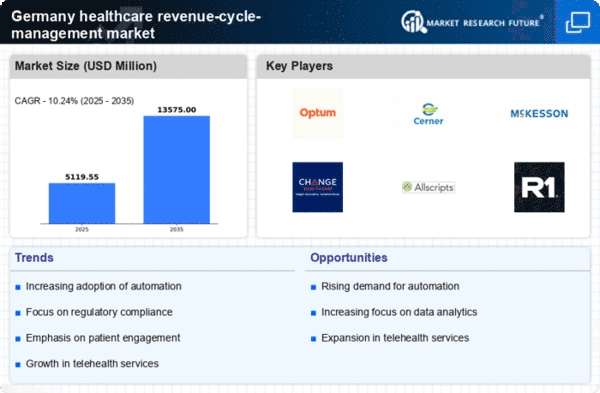Rising Healthcare Expenditures
Germany's healthcare sector is characterized by rising expenditures, which significantly impacts the healthcare revenue-cycle-management market. In 2025, healthcare spending in Germany is projected to reach €500 billion, reflecting a growth rate of approximately 5% annually. This increase in spending necessitates robust revenue-cycle management solutions to ensure that healthcare providers can effectively manage their financial resources. As hospitals and clinics face mounting pressure to deliver high-quality care while controlling costs, the demand for sophisticated revenue-cycle management tools is likely to escalate. These tools not only assist in optimizing revenue collection but also enhance financial reporting and compliance with regulatory standards. Thus, the healthcare revenue-cycle-management market is poised for expansion as organizations seek to navigate the complexities of rising healthcare costs.
Focus on Patient-Centric Financial Solutions
The healthcare revenue-cycle-management market is witnessing a shift towards patient-centric financial solutions in Germany. As patients increasingly seek transparency in healthcare costs, providers are compelled to adopt strategies that enhance patient engagement in the billing process. By 2025, it is expected that 25% of healthcare organizations will implement patient-friendly billing systems that provide clear, itemized statements and flexible payment options. This focus on patient-centricity not only improves patient satisfaction but also aids in reducing outstanding receivables. Furthermore, organizations that prioritize patient engagement in their revenue-cycle processes are likely to experience improved collection rates and reduced administrative costs. Consequently, the healthcare revenue-cycle-management market is evolving to meet the demands of a more informed and engaged patient population.
Technological Advancements in Data Analytics
Technological advancements in data analytics are reshaping the landscape of the healthcare revenue-cycle-management market in Germany. The integration of artificial intelligence (AI) and machine learning (ML) into revenue-cycle processes is becoming increasingly prevalent. By 2025, it is anticipated that over 40% of healthcare organizations will leverage data analytics to identify trends, predict patient behavior, and optimize revenue collection strategies. These technologies enable providers to analyze vast amounts of data, leading to more informed decision-making and improved financial outcomes. Moreover, the ability to forecast revenue and manage claims more effectively positions organizations to enhance their operational efficiency. As a result, the healthcare revenue-cycle-management market is likely to benefit from the growing adoption of advanced analytics tools.
Regulatory Changes and Compliance Requirements
Regulatory changes and compliance requirements are exerting a significant influence on the healthcare revenue-cycle-management market in Germany. As the government continues to implement new healthcare policies, providers must adapt their revenue-cycle processes to remain compliant. In 2025, it is projected that compliance-related costs will account for approximately 15% of total revenue-cycle expenditures for healthcare organizations. This necessitates the adoption of comprehensive revenue-cycle management solutions that can effectively address regulatory challenges. Organizations that invest in compliance-focused technologies are likely to mitigate risks associated with audits and penalties, thereby safeguarding their financial stability. As a result, the healthcare revenue-cycle-management market is expected to grow as providers seek to navigate the complexities of regulatory compliance.
Increasing Demand for Efficient Billing Processes
The healthcare revenue-cycle-management market in Germany is experiencing a notable surge in demand for efficient billing processes. As healthcare providers strive to optimize their financial performance, the need for streamlined billing systems becomes paramount. In 2025, it is estimated that approximately 30% of healthcare organizations in Germany will adopt advanced revenue-cycle solutions to enhance their billing accuracy and reduce claim denials. This shift is driven by the necessity to improve cash flow and minimize administrative burdens. Furthermore, the integration of electronic health records (EHR) with billing systems is expected to facilitate real-time data access, thereby expediting the billing process. Consequently, the healthcare revenue-cycle-management market is likely to witness substantial growth as organizations prioritize efficiency in their financial operations.




















Leave a Comment